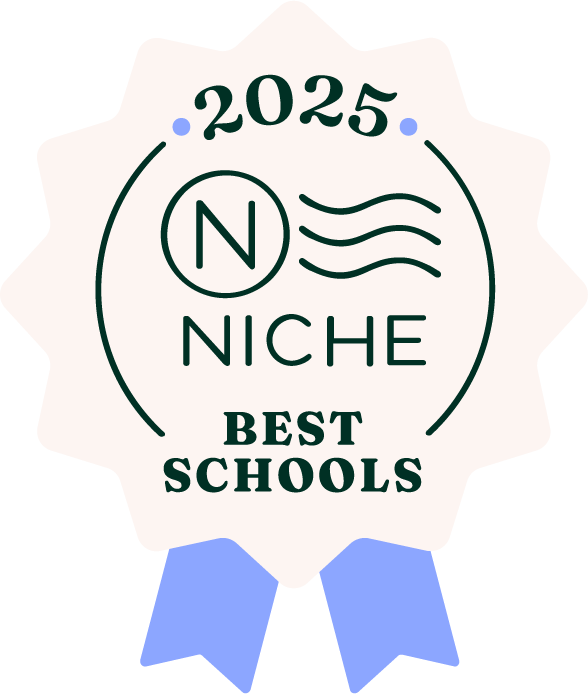Every Friday, Junior High students at the Greensboro Montessori School participate in a hands-on experiential education program in which they work together in teams simulating different aspects of a micro economy that is based on a Farm to Fork concept. One of the outcomes of the program is the preparation of a weekly meal for 40+ people in our certified kitchen. This self-run lunch business is known as Maria’s Cafe. Another outcome of the micro economy program is the operation of a mobile farmer’s market stand that enables students to sell produce from the School’s gardens and student artwork. Keep reading to learn more about the structure of micro economy program and how students are acquiring skills that will serve them long after graduation.
Each student cycles through a “career” in their participation in the micro economy program. There are a total of six career choices – research and development, design and fabrication, tribal council, finance, farm, and restaurant. Each career has a specialized focus and functions as its own entrepreneurial enterprise. Students apply for management positions within these careers and have a chance to hone in on particular interests and skills while serving the community. While each career has its own focus, all together, they operate under one umbrella known as Irossetnom Micro Economies Incorporated, also known by its acronym, IMI. (If you’re wondering about the name Irossetnom, that’s Montessori spelled backwards!)
On the Research and Development Team students specialize in scientific research and product development. Their current projects include managing the GMS chicken chickens, which they bought in 2016, and selling eggs, as well as making products in the forge that can be sold at Maria’s Market. Management positions include Director of Scientific Inquiry, Sustainability Coordinator, and Science Writer.
On the Design and Fabrication Team students work with 2D and 3D Design. They take photographs and design the GMS yearbook annually. They also take orders from the community on 3D products ranging from new classroom tables, to toddler picnic tables, to wooden recycling center bins on casters, to the GMS Farm Cart. Students work with design products like SketchUp to create 2D templates for products before they engage in the real life building process. Once made, these beautiful items are sold. Management positions include 2D Creative Director, Media Coordinator and Director of Technology, Media Assistant, and 3D Creative Director.
The Finance Team oversees finances for all of IMI. They process receipts for ingredients and materials, analyze operation costs, and present findings on net profits to the community on a weekly basis. They also conduct some marketing activities, like creating order forms to reserve food on Fridays, conducting surveys to find out how “customers” find the dining experience, and managing credit card sales and pre-orders. Management positions on this team include Chief Financial Officer, Assistant Bookkeeper, and Marketing Director. The Finance Team also runs a concessions stand.
The Tribal Council Team is the governing body of IMI. They host special events like dances, the Evening in the Pumpkin Patch (a Halloween-themed event for younger GMS students), Rock-a-thon (an all-night movie watching marathon to raise money for charities), a holiday toy drive, talent shows, and other special events benefiting the whole by bringing everyone together to celebrate community and raise money for charities and IMI. Management positions include equal representatives within the council.
On the Farm Team, students participate in all aspects of growing the food and getting it to the Table (Maria’s Cafe), and to the Farm Cart (Maria’s Market). They plant seeds, build greenhouse platforms, harvest and wash vegetables and deliver them fresh to the kitchen (very, very fresh,) take inventory on garden produce and plan for future crops, maintain the bee hives, cut flowers and make bouquets to sell to local vendors, and learn about local agriculture, different methods of growing food and how each affects our planet, and help to plan future menus based on what is growing seasonally. They also decorate our tables with nature inspired settings. Many of the ingredients in our Maria's Cafe recipes come directly from the GMS gardens, especially whole unprocessed foods like garlic, onions, salad greens, eggplant, bell peppers, sweet potatoes, persimmons, apples, figs, crab apples, butternut squash, tomatoes, and much more. We use no genetically modified ingredients (GMO’s) and part of our mission is to understand what is happening to our food system and how we can play our part to fix it. What better way to learn to be a global responsible citizen? Management positions on this team include Market Manager, Produce Manager(s), and Tea House Manager.
On the Restaurant Team (Maria’s Cafe), students chop, julienne, emulsify, grate, and learn new skills every week as they prepare the meal, and clean up afterwards. They gain much culinary expertise and are held to professional restaurant rules. They are learning about industrial equipment and processes and are inspected by the Health Department three times per year. They learn knife and food safety as well as quick methods for peeling and chopping garlic and onions and how to work with the best and freshest ingredients to make a delicious meal. Management positions include Head Chef, Sous Chef, Pastry Chef, and Pantry Manager.


